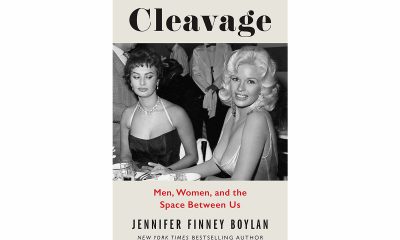National
Donnelly continues crusade against ‘Don’t Ask’ repeal
CPAC speaker wants more hearings before ban is lifted

A leading opponent of “Don’t Ask, Don’t Tell” repeal is continuing her effort to prevent gays from serving openly in the U.S. military and is calling for extended discussion before the military’s gay ban is lifted.
Elaine Donnelly, president of the Center for Military Readiness, on Thursday called for more congressional hearings on allowing gays to serve openly in the military and time to question Pentagon officials before repeal of “Don’t Ask, Don’t Tell” takes effect.
“Our position is Congress should tell the Pentagon, ‘Not so fast!'” she said. “They need to ask questions, they need to have hearings. We need to keep in mind what is the most important thing. … Certainly, the military is too important to be used for social engineering, political payoffs. Diversity is important, yes, but not as a primary goal.”
Donnelly urged for greater deliberation before enacting “Don’t Ask, Don’t Tell” repeal during a panel titled “How Political Correctness Is Harming America’s Military” at the 2011 Conservative Political Action Conference in D.C.
In 20o8, Donnelly gained notoriety as an opponent of gays in the military when she testified during a House hearing on “Don’t Ask, Don’t Tell.” After her testimony, when she decried the possible spread of “HIV positivity” in the military and the “forced intimacy” of straight troops serving with gays, Donnelly was widely criticized and lampooned by the media.
During her CPAC panel appearance, Donnelly denounced the law allowing for repeal of “Don’t Ask, Don’t Tell” that President Obama signed in December, which she said was “rushed through recklessly” in the lame-duck session of the 111th Congress.
“It’s supposed to be a non-discrimination policy,” she said. “But instead of calling it ‘Not “Don’t Ask, Don’t Tell,”‘ … let’s give it a name. We call it the ‘Lesbian, Gay, Bisexual, Transgender Law for the Military’ — ‘LGBT Law’ for short. We have to start thinking about it in terms of what it would do.”
The repeal provides for an end to “Don’t Ask, Don’t Tell” only after the president, the defense secretary and the chairman of the Joint Chiefs of Staff certify the U.S. military is ready for repeal. But Donnelly said this language was a “meaningless” provision in the law.
“There’s going to be a lot of problems,” she said. “The Congress has yet to have hearings on the House side on this, so our position is this: don’t you think we should ask some questions first?”
Fred Sainz, vice president of communications for the Human Rights Campaign, said the debate over ending “Don’t Ask, Don’t Tell” has gone on for 17 years and noted House and Senate committees had several hearings in the last Congress.
“No more discussion is needed on this issue,” Sainz said. “And I think Republicans and Democrats, not just Democrats, but Republicans and Democrats, concluded that that was the case when they voted to go ahead and pass this legislation last year. At some point, you just have to call the question, and that’s exactly what happened.”
During the panel, Donnelly said she and other opponents of “Don’t Ask, Don’t Tell” repeal assembled a 25-page list of questions that “not should be asked, but must be asked” to evaluate the mesaure passed last year.
Among the questions, Donnelly said, is which of the findings in the 1993 law are not valid — how will the armed forces “train people to be less senstive to sexual privacy and modesty.”
Donnelly also raised concerns about “zero tolerance” for service members who object to serving alongside openly gay people.
“What about when you have a problem and say, “This needs to changed,'” Donnelly said. “And someone says, ‘What’s the matter with you? Is there something wrong with your attitude? Are you prejudiced? We’ll get you more training — more LGBT training.'”
Alex Nicholson, executive director of Servicemembers United, said what Donnelly referred to as “zero tolerance” is actually unprofessional behavior in the U.S. military.
“You see a lot, in my experience, from people who oppose this policy change and others, the desire to express their beliefs in an inappropriate and unprofessional manner, and then they get upset when they’re not permitted to engage in that type of behavior,” Nicholson said.
Donnelly also said the controversies found in teaching about same-sex couples in civilian schools would mean the military would likewise have similar problems and would need to implement a “school of choice” system.
“We know how controversial it is to have LGBT training in civilian schools,” Donnelly said. “Just imagine what that’s going to be in the Department of Defense schools where there really is no choice. Will we not need ‘school of choice’ in the Department of Defense? Yes, we will.”
Nicholson said Donnelly’s assertion is a example of someone “talking about the military who has never spent one single day in uniform.”
“There aren’t multiple ideologically based training schools for anything in the military, whether that be for occupations or the leadership academies and things like that,” he said.
Also, Donnelly said military chaplains would have to “endorse homosexuality” if they had to be ministers for openly gay people in the military.
“It was said during hearings in the Senate, ‘Well, we’re going to lose a lot of chaplains,’ so one of the questions is ‘How many chaplains are we going to lose?'” she said.
Sainz identified Donnelly’s assertion about chaplains as among “the half-truths or complete falsehoods” that she’s been repeating in her opposition to “Don’t Ask, Don’t Tell” repeal.
“No one’s being asked to endorse homosexuality,” Sainz said. “It’s kind of a bizarro statement. They are not being asked to put their religious beliefs aside.”
In addition to denouncing the repeal law, Donnelly also took issue with the Pentagon’s report on “Don’t Ask, Don’t Tell.” Taking a line from Sen. John McCain (R-Ariz.), an opponent of repeal in the Senate, Donnelly said the survey that went out to service members as part of the report didn’t ask the right question.
“The survey that was done, the RAND Corp. had a lot to do with it, and a company called Westat or something,” Donnelly said. “They had all these questions and they never once asked the question: ‘Do you favor retention or repeal of the law?'”
One of the questions on the survey asks service members if “Don’t Ask, Don’t Tell” is repealed and they are working with someone who says he or she is gay, how would it affect their unit’s ability to work together to get the job done. About 70 percent of responders said it would have a positive, mixed or no effect.
Nicholson said Donnelly didn’t like the questions that were part of the survey because they didn’t result in responses that would have worked in her favor.
“I think she’s just upset that the purpose was not to conduct a referendum on military policy among members of the force because she thinks she would have won that referendum,” he said.
Joining Donnelly during the panel discussion was Ilario Pantano, a Marine sniper who served in the Iraq war, who used his discussion time to argue that the United States is a Christian nation and that China is building up its defenses “because they fear Jesus Christ.”
Pantano also said he concurred with Donnelly’s sentiments and noted that former Rep. Patrick Murphy, who championed “Don’t Ask, Don’t Tell” repeal in the U.S. House, received what he said was $90,000 from the liberal MoveOn.org and $40,000 from the Human Rights Campaign in the 2010 election.
“If people talk ultimately about issues of fairness, why are they needing to spend tens of millions of dollars to lobby the Democratic Party if it’s truly about efficacy and the good of the people who’ve been in the armed forces,” Pantano said.
In response, Sainz said HRC’s contributions to Murphy’s campaign are “hardly remarkable” because the Pennsylvania lawmaker was a friend and deserved re-election. Sainz added right-wing groups are donating money to anti-gay lawmakers who oppose “Don’t Ask, Don’t Tell” repeal.
Sainz also said Pantano was being “wildly inaccurate” on the money he says HRC spent on the Murphy campaign. According to the Federal Election Commission website, HRC contributed slightly more than $9,000 to Murphy’s campaign in the 2010 election.
Donnelly also attempted to raise fears about the “Don’t Ask, Don’t Tell” repeal law by saying it could open the door to allow openly transgender people in the military. Currently, transgender people aren’t allowed to serve in the armed forces because of regulations.
“Right now, they’re saying no transgenders,” Donnelly said. “They’ve thrown the ‘T’s’ under the bus. But the president has celebrated ‘LGBT Equality Month’ twice in the month of June. So why not? Why not? What is the rationale for excluding them?”
Mara Keisling, executive director for the National Transgender Center for Equality, said Donnelly was raising the issue of transgender people in the U.S. military to draw attention to “her last shrill efforts to try to stop “Don’t Ask, Don’t Tell’ repeal,” but added she’s right that trans people shouldn’t be excluded.
“There is no more reason to exclude trans people from service than there is to exclude women, or anybody, African Americans or gay people,” Keisling said. “It’s just all based on old stereotypes that people like Elaine Donnelly use to advance their own causes.”
Keisling noted that the national study on trans people made public last week found that 20 percent of them were veterans, which she said was double the national average.
U.S. Supreme Court
Supreme Court to consider bans on trans athletes in school sports
27 states have passed laws limiting participation in athletics programs

The U.S. Supreme Court on Thursday agreed to hear two cases involving transgender youth challenging bans prohibiting them from participating in school sports.
In Little v. Hecox, plaintiffs represented by the ACLU, Legal Voice, and the law firm Cooley are challenging Idaho’s 2020 ban, which requires sex testing to adjudicate questions of an athlete’s eligibility.
The 9th U.S. Circuit Court of Appeals described the process in a 2023 decision halting the policy’s enforcement pending an outcome in the litigation. The “sex dispute verification process, whereby any individual can ‘dispute’ the sex of any female student athlete in the state of Idaho,” the court wrote, would “require her to undergo intrusive medical procedures to verify her sex, including gynecological exams.”
In West Virginia v. B.P.J., Lambda Legal, the ACLU, the ACLU of West Virginia, and Cooley are representing a trans middle school student challenging the Mountain State’s 2021 ban on trans athletes.
The plaintiff was participating in cross country when the law was passed, taking puberty blockers that would have significantly reduced the chances that she could have a physiological advantage over cisgender peers.
“Like any other educational program, school athletic programs should be accessible for everyone regardless of their sex or transgender status,” said Joshua Block, senior counsel for the ACLU’s LGBTQ and HIV Project. “Trans kids play sports for the same reasons their peers do — to learn perseverance, dedication, teamwork, and to simply have fun with their friends,” Block said.
He added, “Categorically excluding kids from school sports just because they are transgender will only make our schools less safe and more hurtful places for all youth. We believe the lower courts were right to block these discriminatory laws, and we will continue to defend the freedom of all kids to play.”
“Our client just wants to play sports with her friends and peers,” said Lambda Legal Senior Counsel Tara Borelli. “Everyone understands the value of participating in team athletics, for fitness, leadership, socialization, and myriad other benefits.”
Borelli continued, “The U.S. Court of Appeals for the Fourth Circuit last April issued a thoughtful and thorough ruling allowing B.P.J. to continue participating in track events. That well-reasoned decision should stand the test of time, and we stand ready to defend it.”
Shortly after taking control of both legislative chambers, Republican members of Congress tried — unsuccessfully — to pass a national ban like those now enforced in 27 states since 2020.
Federal Government
UPenn erases Lia Thomas’s records as part of settlement with White House
University agreed to ban trans women from women’s sports teams

In a settlement with the Trump-Vance administration announced on Tuesday, the University of Pennsylvania will ban transgender athletes from competing and erase swimming records set by transgender former student Lia Thomas.
The U.S. Department of Education’s Office for Civil Rights found the university in violation of Title IX, the federal rights law barring sex based discrimination in educational institutions, by “permitting males to compete in women’s intercollegiate athletics and to occupy women-only intimate facilities.”
The statement issued by University of Pennsylvania President J. Larry Jameson highlighted how the law’s interpretation was changed substantially under President Donald Trump’s second term.
“The Department of Education OCR investigated the participation of one transgender athlete on the women’s swimming team three years ago, during the 2021-2022 swim season,” he wrote. “At that time, Penn was in compliance with NCAA eligibility rules and Title IX as then interpreted.”
Jameson continued, “Penn has always followed — and continues to follow — Title IX and the applicable policy of the NCAA regarding transgender athletes. NCAA eligibility rules changed in February 2025 with Executive Orders 14168 and 14201 and Penn will continue to adhere to these new rules.”
Writing that “we acknowledge that some student-athletes were disadvantaged by these rules” in place while Thomas was allowed to compete, the university president added, “We recognize this and will apologize to those who experienced a competitive disadvantage or experienced anxiety because of the policies in effect at the time.”
“Today’s resolution agreement with UPenn is yet another example of the Trump effect in action,” Education Secretary Linda McMahon said in a statement. “Thanks to the leadership of President Trump, UPenn has agreed both to apologize for its past Title IX violations and to ensure that women’s sports are protected at the university for future generations of female athletes.”
Under former President Joe Biden, the department’s Office of Civil Rights sought to protect against anti-LGBTQ discrimination in education, bringing investigations and enforcement actions in cases where school officials might, for example, require trans students to use restrooms and facilities consistent with their birth sex or fail to respond to peer harassment over their gender identity.
Much of the legal reasoning behind the Biden-Harris administration’s positions extended from the 2020 U.S. Supreme Court case Bostock v. Clayton County, which found that sex-based discrimination includes that which is based on sexual orientation or gender identity under Title VII rules covering employment practices.
The Trump-Vance administration last week put the state of California on notice that its trans athlete policies were, or once were, in violation of Title IX, which comes amid the ongoing battle with Maine over the same issue.
New York
Two teens shot steps from Stonewall Inn after NYC Pride parade
One of the victims remains in critical condition

On Sunday night, following the annual NYC Pride March, two girls were shot in Sheridan Square, feet away from the historic Stonewall Inn.
According to an NYPD report, the two girls, aged 16 and 17, were shot around 10:15 p.m. as Pride festivities began to wind down. The 16-year-old was struck in the head and, according to police sources, is said to be in critical condition, while the 17-year-old was said to be in stable condition.
The Washington Blade confirmed with the NYPD the details from the police reports and learned no arrests had been made as of noon Monday.
The shooting took place in the Greenwich Village neighborhood of Manhattan, mere feet away from the most famous gay bar in the city — if not the world — the Stonewall Inn. Earlier that day, hundreds of thousands of people marched down Christopher Street to celebrate 55 years of LGBTQ people standing up for their rights.
In June 1969, after police raided the Stonewall Inn, members of the LGBTQ community pushed back, sparking what became known as the Stonewall riots. Over the course of two days, LGBTQ New Yorkers protested the discriminatory policing of queer spaces across the city and mobilized to speak out — and throw bottles if need be — at officers attempting to suppress their existence.
The following year, LGBTQ people returned to the Stonewall Inn and marched through the same streets where queer New Yorkers had been arrested, marking the first “Gay Pride March” in history and declaring that LGBTQ people were not going anywhere.
New York State Assemblywoman Deborah Glick, whose district includes Greenwich Village, took to social media to comment on the shooting.
“After decades of peaceful Pride celebrations — this year gun fire and two people shot near the Stonewall Inn is a reminder that gun violence is everywhere,” the lesbian lawmaker said on X. “Guns are a problem despite the NRA BS.”



















